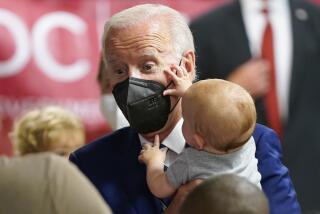Compromise Can Be a Shot in the Arm
- Share via
President Clinton has been criticized in his battles with Capitol Hill for giving in too little and for giving in too much. In the case of his proposal to immunize America’s children, he appears to have found the right balance.
Under a compromise that has the support of House Democrats and is similar in many ways to an alternative Republican proposal, the vaccine program will now be limited to the most needy children--those from poor families or those without health insurance. This sensible compromise, according to estimates, would cut the cost of the original $1.1-billion program by more than half.
When he announced his immunization plan last month, Clinton called for having the federal government, in effect, ensure that every child be immunized by age 2. The government would have bought and distributed all childhood vaccines to private doctors and public clinics nationwide.
Pharmaceutical companies balked, saying that government control of vaccine would reduce profits and provide a disincentive for continued vaccine research. And others said that the government ought not to give vaccine free to insured children or to children whose parents could afford to have them immunized.
The criticisms had merit, and the Administration, with the help of Reps. Henry A. Waxman (D-Los Angeles) and John D. Dingell (D-Mich.), negotiated a compromise bill, which passed a key House subcommittee Thursday. The new immunization program deserves to be well on its way to becoming law.
More to Read
Get the L.A. Times Politics newsletter
Deeply reported insights into legislation, politics and policy from Sacramento, Washington and beyond. In your inbox twice per week.
You may occasionally receive promotional content from the Los Angeles Times.










